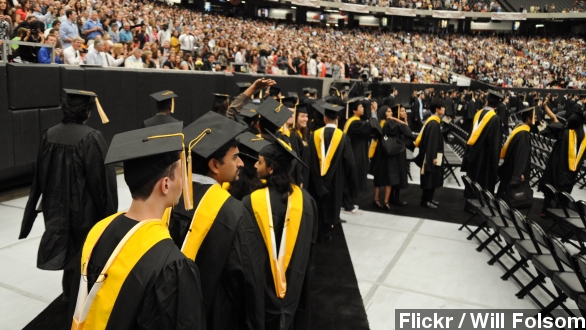Forget prestige, a new poll shows post-college well-being comes from your in-college experiences, not that university’s name.
“Toga! Toga!” (Via Universal Pictures / "National Lampoon's Animal House")
OK, maybe not that kind of experience. The Gallup-Purdue University survey asked about 30,000 college graduates questions about their engagement with work and overall wellbeing.
Thirty-nine percent of respondents reported being engaged with their work. Most respondents said they were “thriving” in one of the study’s markers of wellbeing, including financial, health and social, but only 11 percent reported doing well in all of them. (Via University of Texas at Austin, Harvard University)
What’s interesting here, according to Gallup is, "Public or private, small or large, very selective or less selective -- hardly matters at all to their workplace engagement and current well-being."
Instead, what happens to a student during college matters much more.
Graduates who said they had at least one professor “who made [them] excited about learning” were twice as likely to be thriving in all areas of well-being. And being “extremely active in extracurricular activities” had the same effect on a graduate’s engagement at work. (Via Tulane Public Relations, Flickr / Will Folsom)
That said, The Wire notes, attending a school like Harvard isn’t without its benefits, “like access to an alumni network or richer resources. But attending a selective college alone won't usher you into a life of well-adjusted happiness.”
In fact, graduating with debt will welcome quite the opposite. (Via The Wall Street Journal)
“So there’s been a real struggle over the last few years to figure out what the value of a college degree is since they cost so much now, and kids are going into such deep debt to get them.”
NPR adds, “Only 2 percent of those with $20,000 to $40,000 in undergraduate loans reported they were ‘thriving.’ That's pretty troubling, since $29,400 is the national average for the 7 in 10 students who borrow. ”
Moral of the story is, students shouldn’t sweat over that acceptance letter. Instead, save the energy for getting involved in college – any college.


